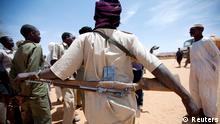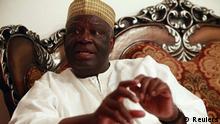But since then,the situation hasn't improved, says Anne Bartlett, a sociology professor at the University of Chicago who has been following the Darfur conflict for years. She is the head of an NGO that promotes sustainable development in Darfur. She has also worked as a UN negotiator.
 Numerous rebel groups in Darfur have different interests and ideologies
Numerous rebel groups in Darfur have different interests and ideologies"For safety reasons, most of the aid agencies have pulled out of Darfur. There is almost no humanitarian provision and there is very little protection. The situation has considerably deteriorated, in my opinion," Barlett told DW.
Many actors, many fronts
The situation in Darfur is complex. Initially, rebel groups fought for a greater voice against the Sudanese government and the militias it financed. But today there are several other fronts. Rebel groups fight the government but also each other. Groups with different ethnic backgrounds fight for territory and political influence. Farmers and nomads fight over resources and criminal gangs also operate in Darfur.
 Anne Bartlett says the UN mission failed to protect the people
Anne Bartlett says the UN mission failed to protect the peopleThe International Criminal Court has issued an arrest warrant against President Omar al-Bashir, on charges of genocide in Darfur. The Sudanese foreign minister's state secretary, Rahmat Allah Mohammad Othman, believes that the accusation is politically motivated and denies claims that the humanitarian situation in Darfur has deteriorated.
"I myself was in Darfur two weeks ago. No one complained about the humanitarian situation," Othman told DW. "Maybe they are confusing Darfur with other countries or another part of Sudan."
Tough peace negotiations
Othman also dismisses claims that Sudan still supplies arms to Darfur despite a UN embargo. In an exclusive interview with DW, the UN Special Representative and Chief of Mission in Darfur, Ibrahim Gambari,said, " obviously there are weapons , when there is fighting between the government and armed groups."
Gambari has considerable experience in how to talk to an autocratic leader. He has worked for Nigerian President Abacha and was a guest at the wedding of Chadian President Deby. As a United Nations negotiator, he negotiated for the UN with Zimbabwe's President Mugabe and Burma's former head of state Shwe.
 Ibrahim Gambari is the UN Special Representative and Chief of Mission in Darfur
Ibrahim Gambari is the UN Special Representative and Chief of Mission in Darfur"The only way to reach a comprehensive and a conclusive peace agreement is to commit the government and the armed movements in the cession of hostilities and cease fire," Gambari said.
UN troops should be reduced
The peace negotiations between rebel groups and the government have proven to be extremely complicated. On the rebel side, several groups have different interests and ideologies. In 2011, a peace agreement was signed – but only by one rebel group and the government. Ibrahim Gambari, however, is convinced that the United Nations will continue its negotiating efforts and extend its mandate for another year.
But he does not agree with increasing the numbers of UN personnel in Darfur. "The security situation has improved in many parts of Darfur, " said Gambari. "We can therefore reduce the number of troops, without undermining the gain that we have made in contributing to security stability in Darfur."
In the meantime the UN Security Council has extended for a year the mandate of the UN and African Union peacekeeping force in Darfur. It also reduced the forces from 22,445 personnel to about 16,000.
Click here to read this on Deutsche Welle















































